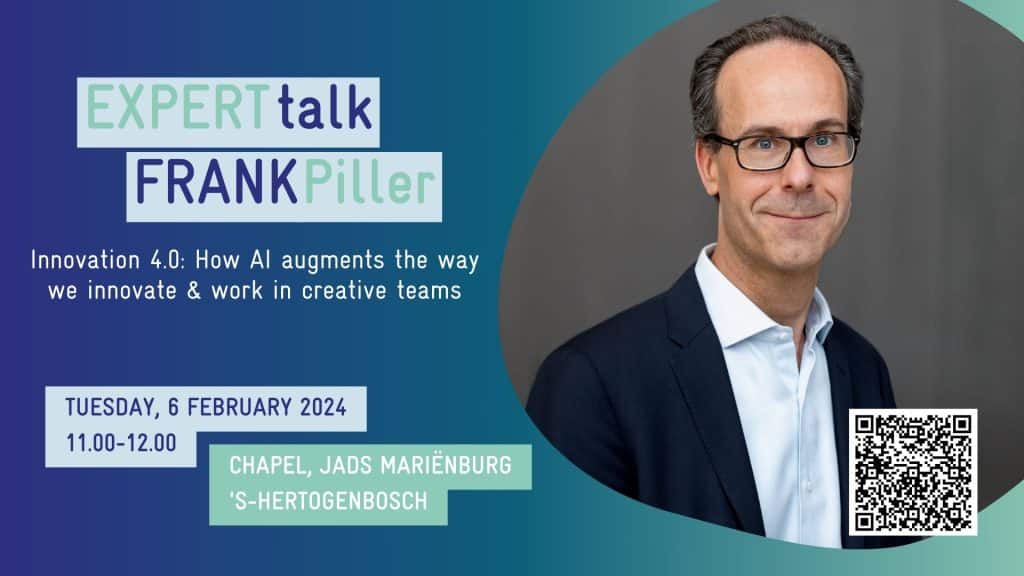Expert Talk: Frank Piller - AI and working in creative teams
Frank Piller - How AI augments the way we innovate & work in creative teams
Join us on February 6, 2024, for an Expert Talk by Prof. Frank Piller. In his 30-minute presentation, tailored for data scientists and practitioners, Frank Piller will delve into the fascinating intersection of artificial intelligence (AI) and human creativity in the realm of innovation. From automating ideation with OpenAI’s ChatGPT to leveraging generative adversarial networks (GANs) for rapid problem-solving and design, this talk will paint a picture of the hybrid teams emerging, where humans and machines collaborate in unprecedented ways.
Innovation 4.0: How AI augments the way we innovate & work in creative teams
Research and development has always relied on cutting-edge technologies to push the boundaries of innovation – combined with human creativity. Today, a new generation of artificial intelligence (AI) and machine learning (ML), in particular large language models and transformer architectures, offers new ways to expand the problem and solution space in an innovation project.
At the same time, these algorithms are challenging our established perspectives on human creativity and problem solving. Long considered the furthest frontier, AI is now being applied to “creative” work, such as OpenAI’s ChatGPT algorithm, which can automate the ideation and design process. Other algorithms can automatically identify latent market needs from, for example, social media streams or CRM systems.
In engineering, the use of generative adversarial networks (GAN) is driving a new generation of problem solving and design approaches. These algorithms have dramatically reduced the time it takes to design a new component with novel functionality. Other applications build on advanced simulation models using the digital twin, linking engineering with usage data and real-time executable models. AI has also proven its power in materials science, with algorithms and robotic process automation working hand in hand to take this discovery rate to new dimensions.
Generative AI systems become partners in the innovation process. Hybrid innovation teams emerge, where humans and machines collaborate. However, these applications are not without constraints and limitations. A future of purely data-driven and algorithm-based “autonomous innovation” seems unlikely. AI-driven methods and approaches will complement existing methods – and reshape them and the innovation processes in which they are embedded. But how and where? For example, do CTOs need to implement “prompt engineering” and what are the capabilities of these prompters?
Using numerous examples and case studies from the field, Prof. Frank Piller will provide a framework for understanding current developments in this area and reflect on what the innovation process of the future might look like.
Expert Talks
Small scale events where a Data Science expert – academic or professional – gives a presentation about a data related subject that is of interest to both data scientists and practitioners.

Prof. Frank Piller is a professor of technology management at RWTH Aachen University, Germany’s leading institute of technology and its national center for production engineering. At RWTH, he heads the Institute for Technology & Innovation Management and is academic director of the RWTH Executive MBA program. His research interests include mass customization and how established companies can become better business model innovators in times of disruptive change.
Frank Piller’s most recent research focuses on the impact of AI and ML on new product and process development in the age of Industry 4.0, Digital Transformation and the Internet of Things. He is the chairman of the largest German cross-industry network on “Business Model Innovation for Industry 4.0”, an initiative of more than 40 companies organized by VDI, the Association of German Engineers. In this and similar roles, Prof. Piller is involved in shaping the digital agenda of many European market leaders. In addition to his academic endeavors, Frank has been involved in several companies. He is currently a board member and active investor in doob AG, a pioneer in the avatar economy and digital twins.
